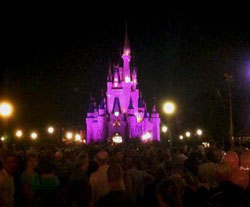 Although it's a city well known for being the home of the "Happiest place on earth," Orlando has much more to offer than Disney World and other local theme parks. Rest assured, being an epicenter for film and entertainment, you can bet you will never get bored in "O-Town."
Although it's a city well known for being the home of the "Happiest place on earth," Orlando has much more to offer than Disney World and other local theme parks. Rest assured, being an epicenter for film and entertainment, you can bet you will never get bored in "O-Town."
This centrally located Florida city, also known as "Hollywood East" offers the largest single-story mall in the USA, numerous green golf courses and a thriving music and nightlife scenes. If you're considering moving to this inland city, get ready for your close up! This guide will offer tips and advice for making your transition to the Sunshine State seamless and exciting.
Orlando Climate
Orlando is considered a subtropical climate, with two major seasons a year due to its proximity to the Gulf Stream. During hurricane season (approximately June through early October for Floridians and other southern state residents), Orlando is typically in its rainy season with high humidity. Late October through April or May, expect a very dry season with some rainfall and warm temperatures. Summer month temperatures tend to be in the 90-degree range, cooling down to the mid 70's in the spring and winter months.
Orlando Neighborhoods
There are over 100 neighborhoods within this 110 square-mile city, including many unincorporated communities. It is the hub city of the Greater Orlando metropolitan area with a staggering population of over 2 million people, and includes the Kissimmee and Sanford area – areas most well known for tourist attractions like Disney World, Universal Studios, and SeaWorld.
Much of what is known as "Old Orlando" is in Downtown Orlando along Church Street, but has been increasingly over powered by the Central Business District. You can still find some of the oldest homes in the historic district, complete with Oak trees and brick streets. Suburban neighborhoods such as Winter Park comprise a large portion of the city, and are much quieter alternatives to the hustle and bustle of the business district's industrialized skylines or the tourist-heavy Greater Orlando area.
Registering Your Car
You have 10 days to register your car in Florida from the date you begin working in the state, or register a child in a Florida school. You must have proof of ownership of your vehicle, verification of your VIN (Vehicle Identification Number), and proof of Florida insurance requirements.
You have 30 days to transfer your existing out-of-state driver's license to a Florida driver's license. To do so, you will need your primary identification, proof of Social Security Number and two documents verifying your Florida address. The Florida DMV issues over 400,000 new resident licenses per year, and advises you to know your requirements and have your documents ready prior to going to the office.
Orlando Schools
The public education system in Orlando is operated by Orange County Public Schools. With 178 schools, a student body of over 175,000, it was the 12th largest school district in the US as of 2009. The schools are divided into six Learning Communities of North, East, West, Southeast, Southwest and Central.
Orlando is also home to notable universities such as University of Central Florida, Valencia College, Seminole State College of Florida, Nova Southeastern University, Full Sail University, Florida Institute of Technology and Florida A & M College of Law.
Orlando Employment
 Tourism, film & entertainment and the gaming industry are all crucial to the backbone of Orlando's economy and the advances in digital innovation. Tourism brings over 50 million people to Orlando each year to enjoy theme parks, eco tours, museums and space center tours.
Tourism, film & entertainment and the gaming industry are all crucial to the backbone of Orlando's economy and the advances in digital innovation. Tourism brings over 50 million people to Orlando each year to enjoy theme parks, eco tours, museums and space center tours.
These multi billion dollar industries help employ much of the workforce in Orlando, which according to the US Census Bureau's 2011 report, over 1 million workers. Walt Disney World hires over 59,000 employees alone. The unemployment rate for Orlando is on a steady decrease, down to approximately 7.5 percent as of January 2013.
Living Costs in the City
The cost of living in Orlando is about 9.5 percent lower than the national average as of 2012. The average home cost in Orlando is approximately $93,000, and if you permanently reside in Florida, you may qualify for Homestead exemption, which can reduce the taxable value on your home and save you approximately $750 per year.
The average salary earned in Orlando is approximately $41,000, and a one-bedroom apartment can range from $600 a month to $1200 depending on location and amenities. And if you're not used to the warmer weather, be prepared for a higher electric bill during the summer months – in a one-bedroom apartment, it can range from $100-$200.
You may pay less on housing when moving to Orlando, but be sure to budget for higher food, entertainment and fuel costs. If you're moving from a northern state, you'll pay about $0.20 more per gallon at the pump, and more for groceries items that cannot be locally grown or produced.
Orlando Moving Resources
Orlando moving companies and storage companies are eager to help you relocate to your new home, whether you're moving from out of state or from another county in Florida. Be sure to get estimates from multiple moving services before you make your decision. Check back to our guides for tips on how to choose your moving service wisely with important questions to ask, differentiating between types of estimates, and mistakes to avoid. Visit the following pages at Movers.com to get quotes for the following services:
Orlando Transportation
Regional transportation in Orlando is provided by LYNX, which constitutes over 2,500 square miles, spanning Orange, Seminole and Osceola Counties. LYNX has a regularly scheduled bus service of 65 routes, with over 5,000 bus stops, according to the city's public transit website. There's also an existing rail line system called CXS that serves the tri-county region.
You can also make use of Greyhound buses, various taxi and shuttle services, and Orlando International Airport (MCO) for all your flights. Many cruise lines and ships also dock out of Cape Canaveral, 45 minutes away from Orlando by shuttle or city bus.
Culture & Contemporary Life
 While Orlando's claim to fame is the abundance of theme parks, more than anywhere else in the world, it is also steeped in culture from its historical ties to Native American tribes.
While Orlando's claim to fame is the abundance of theme parks, more than anywhere else in the world, it is also steeped in culture from its historical ties to Native American tribes.
From art and history museums, to the philharmonic, ballets and theater companies, has enough to keep your social life buzzing. You can enjoy the Winter Park Playhouse and the Orlando Shakespeare Theater, and you'll also be in close proximity to the Kennedy Space Center. Many local festivals are held throughout the year including the Orlando International Fringe Theater Festival and the Harriett Lake Festival of New Plays.
Many of your dining and tourist attractions are located on International Drive, also called "I-Drive" by locals.
Orlando is home to the Orlando Magic NBA team, Orlando City USL soccer team, and Orlando Solar Bears ECHL ice hockey team. It has also hosted the NBA All-Star game three times.
Orlando Relocation Tips
- If you drive a car, be prepared for gridlock when commuting to work. There will be plenty of out-of-state license plates and charter busses and shuttles on the roads at various hours during the day and night.
- Be sure to print directions in addition to using a GPS if you don't know where you're going, as many roads and overpasses are under construction and can throw off your GPS.
- Although Orlando doesn't get the brunt of hurricane damage, always prepare yourself with a hurricane kit packed with essentials like batteries, bottled water, non-perishable food items, blankets, outerwear, a first aid kid, toiletries and flashlights.
- The Orlando Sentinel is the second-largest circulating newspaper in Florida, subscribe to it to find out what's the latest in your new city.
- Cypress and Palmetto trees are in abundance in the Orlando area, as well as potential unfamiliar wildlife such as armadillos, turtles, manatees and cranes. Don't go jumping into lakes, because while rare, there can be gators lurking in the waters.